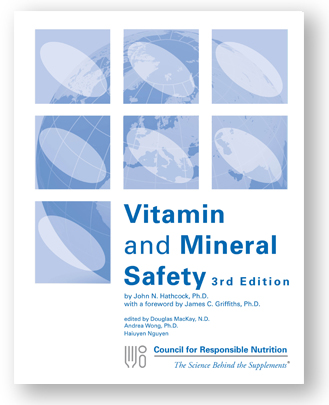CRN provides scientifically-based recommended supplemental levels of 28 nutrients in its Vitamin and Mineral Safety, 3rd Edition handbook (2014).  For other ingredients where voluntary guidelines are appropriate, CRN provides the following recommendations for its members:
For other ingredients where voluntary guidelines are appropriate, CRN provides the following recommendations for its members:
DHEA
For marketers of DHEA or its precursor, pregnenalone, CRN recommends the following guidelines:
- Labeled recommended daily dosage is within the range reflecting current scientific recommendations (5-75 mg);
- The product label includes appropriate information about:
- The need for consultation with a health care professional before use especially if taking prescription medication
- The product is not intended for use for persons under 18 years of age
DHEA Marketing Guidelines
- CRN members will refrain from marketing DHEA products as providing a general anabolic steroid-like response (muscle enlargement, increased strength, etc.).
- CRN members will not target those under 18 years old in their marketing or advertising of DHEA- containing products.
Kava
CRN’s “Suggested Elements for a Voluntary Label for Kava Products” are based on a CRN process of scientific assessment, consultation and coordination with FDA, other trade associations, and outside scientific advisors. CRN members should understand that neither FDA, CRN, nor any other assessment has suggested that scientific evidence has established a causal relationship between kava consumption and liver problems. Thus, CRN’s recommendation is seen solely as a matter of ample prudence.
Suggested Elements for a Voluntary Label for Kava Products:
- The US FDA advises that a potential risk of rare, but severe, liver injury may be associated with kava-containing dietary supplements.
- Ask a health care professional before use if you have or have had liver problems, frequently use alcoholic beverages, or are taking any medication.
- Stop use and see a doctor if you develop symptoms that may signal liver problems, including jaundice (yellowing of the skin or whites of the eyes) and brown urine. Other nonspecific symptoms can include nausea, vomiting, light-colored stools, unusual tiredness, weakness, stomach or abdominal pain, and loss of appetite.
- Not for use by persons under 18 years of age, or by pregnant or breastfeeding women.
- Not for use with alcoholic beverages.
- Excessive use, or use with products that cause drowsiness, may impair your ability to operate a vehicle or heavy equipment.

